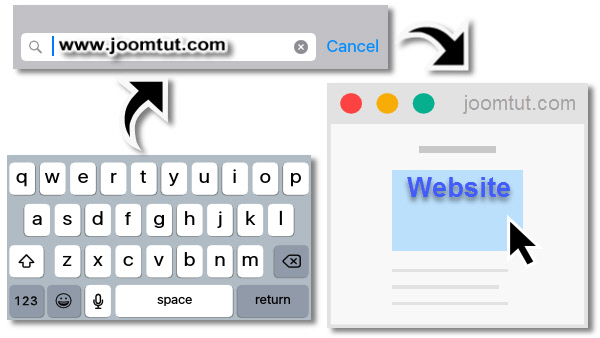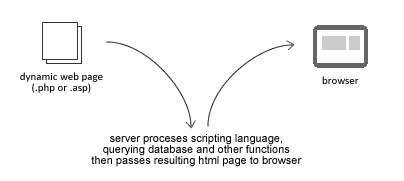
A website - also written as web site, is a collection of web pages and related content that is identified by a common domain name and published on at least one web server. As you known, our website is joomtut.com
All publicly accessible websites collectively constitute the World Wide Web. There are also private websites that can only be accessed on a private network, such as a company's internal website for its employees.
Websites are typically dedicated to a particular topic or purpose, such as news, education, commerce, entertainment or social networking. Hyperlinking between web pages guides the navigation of the site, which often starts with a home page.
Users can access websites on a range of devices, including desktops, laptops, tablets and smartphones. The software application used on these devices is called a web browser.
A website and a web page
A website refers to a central location that contains more than one web page or a series of web pages. For example, JoomTut is considered a website with domain name is joomtut.com which contains thousands of different web pages, including the page you're reading now.
A web page does not need a file extension like .htm or .html to be a web page. Many websites are designed to show a default page named index.html or index.php in a directory or set up to have no file extensions.
A static website and a dynamic website
Static websites
There are many static websites on the Internet, you won't be able to tell immediately if it is static, but the chances are, if the site looks basic and is for a smaller company, and simply delivers information without any bells and whistles, it could be a static website. Static websites can only really be updated by someone with a knowledge of website development. Static websites are the cheapest to develop and host, and many smaller companies still use these to get a web presence.

Advantages of static websites
- Quick to develop
- Cheap to develop
- Cheap to host
- No need for database server
Disadvantages of static websites
- Requires web development expertise to update site
- Site not as useful for the user
- Content can get stagnant
If you need a website with only a few pages to showcase your work, then a static website will usually suffice for you. HTML files with the desired information are created and stored under their own URL on the web server. When users enter the web address, they will see a static HTML page that looks exactly like the file stored on the server.
Dynamic websites
What happens when a website needs to regularly add new content? With a static website, the changes need to be manually carried out in the HTML code of each individual sub page of the web project. With dynamic websites, this manual step is avoided since the web server freshly generates the websites each time they are called up. Instead of continuously issuing the static HTML pages unmodified, the server adjusts the page content automatically according to the last update. The dynamic website is based on a strict division of the content and layout. Both aspects are assembled when the site is entered into the browser. Dynamic websites therefore require more high-performance servers than static websites, as well as a database such as MySQL, with which the server can manage the elements of the website.
Dynamic sites on the other hand can be more expensive to develop initially, but the advantages are numerous. At a basic level, a dynamic website can give the website owner the ability to simply update and add new content to the site. For example, news and events could be posted to the site through a simple browser interface. Dynamic features of a site are only limited by imagination. Some examples of dynamic website features could be: content management system, e-commerce system, bulletin / discussion boards, intranet or extranet facilities, ability for clients or users to upload documents, ability for administrators or users to create content or add information to a site (dynamic publishing).

Advantages of dynamic websites
- Much more functional website
- Much easier to update
- New content brings people back to the site and helps in the search engines
- Can work as a system to allow staff or users to collaborate
Disadvantages of dynamic websites
- Slower / more expensive to develop
- Need database server
- Hosting costs a little more
Generally, dynamic websites rely on pre-defined layouts and design templates, which are filled with relevant content. Due to their flexibility, dynamic websites are the more popular choice.
Choose static or dynamic website
Choosing between using a static or dynamic website really comes down to what the website is required to do. The difference between static and dynamic websites is quite vast in terms of functionality. However, in the case that your website does not require much functionality then a static site may be the best option. In this scenario, the website requires minimal complexity and therefore does not need an external database along with additional resources that will only increase loading times. Alternatively, if you require more complex functionality then a dynamic website is the way to go.
After all, we recommend that you start with a dynamic website that is better for you, even if you do not have any skills. Read and follow our instructions on this site, you will get your own website, it's easier than ever.
Read more: What is the web server and what is the web hosting?



